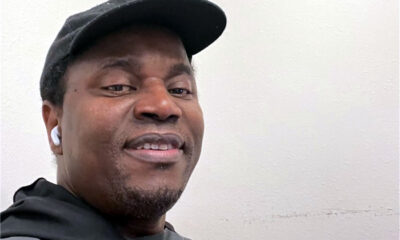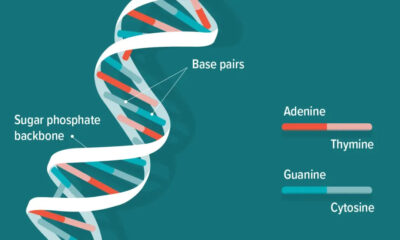Opinion
Opinion: How DNA testing may wrongly nail your wife, by Tunde Odesola
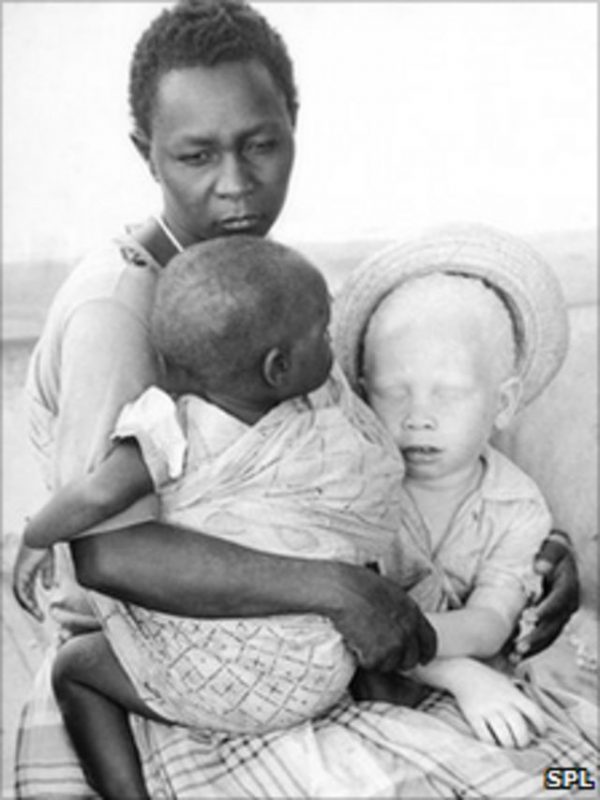
(First published in The PUNCH on October 25 and November 1, 2021)
For a breath of fresh air and to maintain my sanity, I’ll desist from talking about the retired General Muhammadu Buhari in this article. Also, I’ll resist talking about murderous Boko Haram, terrorist Fulani herdsmen, nationwide bandits, humongous corruption and bleeding nepotism which the Buhari regime will bequeath to the incoming Presidency in 2023, if Nigeria exists till then, luckily.
I understand why it’s not easy for Nobel laureate, Professor Oluwole Babatunde Soyinka, to give up hope on his 61-year-old country, Nigeria: no parent will nurture an Abiku from infancy through childhood to adolescence, and incautiously watch the heartless child climb a pawpaw tree with vegetable stalk – without shouting gbajare!
So, I understand the patriotic zeal which, for almost 70 unbroken years, has fired Soyinka up to engage in an eternal struggle for a better Nigeria.
At a point in 1965, Soyinka justifiably held, at gunpoint, the Nigerian Broadcasting Corporation, Ibadan, despite security presence; landed in jail over a pro-Biafra article in 1967, at another point, and escaped into exile in 1994 when he was sentenced to death by the rogue General, Sani Abacha, who was dragging Nigeria to the point of no return. Doubtless, the sagacious Soyinka had a brush with the law one time too many over his conviction.
The last time the white-mane literary icon wrote a novel, Season of Anomy, was 1973. His new novel, Chronicles From the Land of the Happiest People on Earth, is his third, while The Interpreters written in 1965, was his debut.
It’s the mighty shame of a nation that the same themes of corruption, hypocrisy, nepotism, ignorance, blood-letting, poverty that are Soyinka’s preoccupations in his 1965 and 1973 novels, remain his motifs in his 2021 novel.
While some global issues which Soyinka spoke to in his works have changed for the better, it’s excruciatingly painful that his country, Nigeria, remains rooted to the bottomless pit of underdevelopment despite decades of his literary and social advocacy for change.
I wish I could measure the heaviness of the soul of Africa’s foremost literary figure, Soyinka, seeing his Nigeria, the Abiku, swimming in crocodile-infested pond while giant gators glide to gobble the Abiku, together with its defiance and charmed bangle-feet.
For Soyinka, appearance and reality in Nigeria are siamese even though he faults the depiction of Nigerians as ‘happiest people on earth’ in his latest work. Soyinka’s Chronicles From the Land of the Happiest People on Earth is a stinging irony of the sorrowful Nigerian populace described by total strangers as joyful.
However, Appearance and Reality weren’t the same for me some decades ago when I served in the National Youth Service Corps in Umuopu and Aji communities of Igbo-Eze North Local Government Council of Enugu State.
Then, I had a shapely girlfriend, whose name flirts on the periphery of memory now. I think she’s Eucharia. UK, for short. Then, I shared a top-floor two-bedroomed flat with a fellow corper, James Umor, now deceased, in a storey building owned by a traditional shrink called Enwe Nwanjo,who had a son, Emma, who had a beautiful wife, and a baby girl called Kasie. Emma and his family lived on the ground floor of the main building with us. Enwe Nwanjo had died a few years before my NYSC posting, but I still met his legend in Aji as a great healer of sick minds.
UK, an ebony beauty with a dimpled smile, lived in another apartment on the top floor with us. One night something happened.
I had just returned from a journey late in the night. And the whole compound had gone to sleep. I had come out on the verandah to have a drink and smoke a cigarette. Then I heard the bed creak in UK’s room. Sleep fled from my eyes and the hair on my head stood on end.
“But UK told me she was going to Nsukka to see her parents this weekend?” I recalled silently as I tip-toed towards her door in the dark hallway.
I peeped through the keyhole, darkness stared back at me. Then, slowly, very slowly, my mind dismantled the darkness. I saw two human forms, one lying behind the other, on the small metal bed by the curtained window…
I stayed all night on the verandah smoking and shacking whiskey as the harmattan wind froze my bones, but I kept my gaze on UK’s door while I intermittently patrolled the other louvered window to her apartment, which wasn’t in full gaze.
Then, another thing happened. Around 5:30am, or thereabouts, I heard a crowd of people chatting from a distance on the hazy road to our apartment. Then, some male and female students, who lived in the compound, together with a teacher, Florence Enwe, who’s the sister of Emma, and my smiling UK, burst into view. They were all coming back home from a vigil in their catholic church!
I quietly sneaked into my apartment, relieved but still curious. I heard UK’s footfalls as she climbed the stairs and I re-emerged from my apartment. She greeted me and asked smilingly, “You no dey sleep, Kopashon?” She knocked on her door. A preteen girl of about 10 years, whom she described as her sister from Nsukka, opened the door drowsily, stretching and yawning. “Tunde, see ya life,” I said to myself silently.
This is my own experience with Appearance and Reality. While Soyinka sees Nigeria for what it truly is, the Appearance I saw in Enugu Ezike was far from Reality.
What did the 178-year-old British newspaper, The Economist, see when it described the Buhari regime as incompetent, last week? Appearance or Reality? Or both? I’ve vowed not to talk about Buhari in this piece, and I wish to be faithful to my promise. I’ll leave Buhari for now and go ahead to explore DNA testing as a realm of science where results may not always be accurate.
Despite a woman’s fidelity to her man, a DNA testing could wrongly label the faithful woman a cheat if she gave birth to a chimera baby.
Unlike the generality of humanity possessing a single and distinct set of genes, chimera individuals have at least two sets of genes, which can result in a false negative result when the genetic composition of their tissue which was sampled for DNA testing is different from their reproductive tissue.
The case of American Taylor Muhl, a 37-year-old female singer, songwriter and dancer, brings into keener perspectives the issue of genetics and the probability that DNA testing could go wrong.
Though the multiple sets of genetic compositions in chimeras differ from one individual to another, in the case of Muhl, she was her own twin. This means that her embryo swallowed the twin embryo in her mother’s womb.
The fusion of the embryos could be in the gonads, testicles, abdomen, hand, transplanted parts of the body or any part of the body.
If it was in the testicles, for instance, the child fathered by the seminal fluid of the chimera individual would likely carry the gene of the other unborn, infused twin – such that DNA tests on the children produced by the chimera will prove negative.
There’s the case of another American woman, Karen Keegan, whose own children were disproved by DNA testing, until a US court ruled that the pregnancy she had at the time in question should be recorded.
Despite being video recorded at childbirth, DNA testing conducted on Keegan’s new baby also proved that she wasn’t the mother of the child.
When the blindfolded head drops on the hard floor, kpi!, like the back-kick of an angry horse, please, know that not all guillotined heads are guilty.
That is why the Yoruba say, “Ori yeye ni Imogun, t’aise lo po.” Imogun is the Yoruba Golgotha; the place of skulls, where many innocent heads have rolled down the pit of death, spurting hot blood.
If man didn’t reach for the sky at Babel, and all languages were one, I wouldn’t be saddled with the burden of translating this Yoruba proverb into English. But, it’s ok, I’ll try.
“Ori yeye ni Imogun, t’aise lo po” alerts the heedful to the limitations of human judgment and the evil that lurks in man’s heart.
I felt like going beyond the translation of the proverb into English. So, I went in search of the Araba of Osogbo, Chief Ifeyemi Elebuibon, to unravel for me the story behind the proverb.
“Once upon a time,” Elebuibon began, “Ogunda and his friend, Irosun, had an argument. Ogunda contended that many of those beheaded at Imogun are guiltless, but Irosun disagreed, saying, “Ika to ba se, l’Oba nge,” meaning: “It’s only the offending finger that the king cuts.
“So, one night, Ogunda killed an antelope in the forest. He sneaked into Irosun’s house and smeared his sleeping friend’s hands with the blood of the kill even as he sprinkled the blood on the ground, all the way to the king’s pen.
“Very early the following morning, Irosun was still sleeping when the king’s guards broke down his door and arrested him for killing the king’s antelope. Irosun pleaded his innocence, but he was dragged away, all the same, his toes barely touching the ground.
“The guillotine was the final journey for anyone that stole from the royal farm. Irosun’s fate was sealed. He must honour a date with death.
“On the Day of Death, many people trooped out to Imogun, to watch how the thief’s head would tumble down the headful dumpsite, squirting blood.
“The masked hangman with bulging biceps and a razor-sharp sword curved at the tip like Go-to-hell advanced slowly towards the shackled Irosun. He stood at arm’s length and raised up his shiny sword to heaven for the swift strike that would cut off the neck bone, separating the head from the body.
“He brought down his sword impatiently as Ogunda stepped out, and told the truth. Irosun was shaken back to life, sweat and urine had soaked his clothes. Ogunda asked his friend if it was only the guilty that got punished. A shivering Irosun answered, ‘Ori yeye ni Imogun, t’aise lo po’.”
Globally, many women and men have been wrongly accused of not being the mothers and fathers to their biological children because they are chimeras.
Who should she forgive – DNA testing machine or her unbelieving husband – the woman wrongly accused of infidelity because the genotype of her child doesn’t match that of the biological father? Can she even ever forgive?
Who should he blame, DNA testing machine or his fate, the man wrongly denied the joy of fatherhood because he is a chimera?
What is chimerism?
According to the European Journal of Medical Genetics, scientificamerican.com, and healthline.com, a chimera is generally an animal or human that contains the cells of two or more individuals – that is, their bodies contain two different sets of DNA, with the code to make two separate organisms.
Natural chimerism
Scientificamerican.com says, “One way that chimeras can happen naturally in humans is that a foetus can absorb its twin. This can occur with fraternal twins, if one embryo dies very early in pregnancy, and some of its cells are “absorbed” by the other twin. The remaining foetus will have two sets of cells, its own original set, plus the one from its twin.”
Healthline.com says microchimerism, which is another form of natural chimerism, most commonly occurs in humans when a pregnant woman absorbs a few cells from her foetus, adding that the opposite may also happen, where a foetus absorbs a few cells from its mother. “These cells may travel into the mother’s or foetus’s bloodstream and migrate to different organs,” it says.
Tetragametic chimerism
This is also a form of natural chimerism. It happens when two different sperm cells fertilise two different egg cells. Then, these cells all fuse together into one human embryo with crossed cell lines.
Artificial chimerism
“Artificial chimerism,” according to healthline.com, “occurs when a person receives a blood transfusion, stem cell transplant, or bone marrow transplant from another person and absorbs some of that person’s cells. This is called artificial chimerism.
“Artificial chimerism was more common in the past. Today, transfused blood is usually treated with radiation. This helps the transfusion or transplant recipient to better absorb the new cells without permanently incorporating them into their body.”
Cases of chimerism
In its September 2020 publication, the European Journal of Medical Genetics says human chimeras have been described for nearly 70 years by experts but the phenomenon gained public attention in the last 20 years with three high-profile media reports of coincidental findings during parentage testing.
The issue of the American woman, Karen Keegan, mentioned in the first part of this article, was a high-profile case of chimerism reported in 2002, in Boston, when genetic tests were conducted on her as she prepared to receive a kidney from any of her family members. After the tests, it was ‘discovered’ that two of Keegan’s three sons were not hers.
Another high-profile case of chimerism was that of another American, Lydia Fairchild, who had to be videoed at childbirth when genetic tests showed that she wasn’t the mother of her two sons when she applied for assistance for them from the State of Washington. She was subsequently charged with fraud. Even her third childbirth showed she wasn’t the mother of the child. After an extensive medical investigation, however, the genetic composition of her children matched a second DNA lineage found in the narrow tube that connects her vagina to her uterus.
The third reported case of chimerism was that of an unnamed 34-year-old man in California who, in 2015, failed a paternity test after the child was found to have AB blood group while both parents were A. According to an article, How a Man’s Unborn Twin Fathered His Child, published in Times magazine, the sperm that fertilised the wife’s egg belonged to the man’s unborn twin.
A June 2021 article published by The Embryo Project Encyclopedia paraphrased Policy Professor at Tufts University in Medford, Massachusetts, Sheldon Krimsky, and genetics expert, Tania Simoncelli, warning in their 2012 book, Genetic Justice: DNA Databanks, Criminal Investigations, and Civil Liberties, that human chimerism could potentially upend the US court system’s reliance on DNA evidence, citing Fairchild and Keegan as case studies.
But, in a response, legal professor David H. Kaye, in an article, Chimeric Criminals, published in the Minnesota Journal of Law, Science and Technology in 2013, debunks the assertion by Krimsky and Simoncelli.
Kaye, however, ‘acknowledges human chimerism should be a consideration in DNA testing, given its unknown frequency, but rejects the statement that it is a significant obstacle to its use in forensic investigation’.
Kaye also agrees that any human could display some traits of chimerism because there are numerous ways one could be considered a chimera.
Appearance and Reality are, oftentimes, at variance. When serious nations of the world are honestly fighting corruption, the Nigerian government has done everything to shield its son, DCP Abba Kyari, from facing criminal prosecution in the US for fraud.
I watched the video of Kano Governor, Abdullahi Ganduje, dancing with a spurting hose as he washed a vehicle at a car wash inauguration. I think Nigerians shall soon see the launching of the babaringa with the biggest pocket in Kano.
NB: I thank Kemi Samuel, secondary schoolmate and London-based registered nurse, for sharing her knowledge on chimerism with me. God bless Kemo!
Email: tundeodes2003@yahoo.com
Twitter: @tunde_odesola
Facebook: @tunde odesola
TundeOdesola.com
Opinion
Tinubu as yesterday’s rebel and today’s tyrant, By Farooq Kperogi

Tinubu as yesterday’s rebel and today’s tyrant, By Farooq Kperogi
President Bola Ahmed Tinubu’s demonstrably unconstitutional suspension of the elected leaders of Rivers State and his illegal imposition of a retired military lickspittle as sole administrator in the exercise of his otherwise constitutional privilege to declare a state of emergency in any part of the country is the latest addition in a long list of instances of his embrace of the very things he once resented and fought against when he was outside the reins of federal power.
For example, he was brutally censorious of Goodluck Jonathan’s withdrawal of fuel subsidies in 2012. He expressed sentiments in writing and in speeches that resonated with the angst of the masses. He even helped finance a nationwide mass protest that so convulsed the country that Jonathan was compelled to back off his plans.
Yet, one of the first acts Tinubu did as a president in May 2023 was to announce an economically and socially disruptive withdrawal of fuel subsidies that has deepened poverty, annihilated the middle class, and ruptured the very fabric of Nigerian society.
Again, when Olusegun Obasanjo unconstitutionally suspended Plateau State’s Governor Joshua Dariye—along with state legislators— in May 2004 and appointed General Chris Ali as the state’s sole administrator, then Governor Bola Ahmed Tinubu of Lagos rightly called the act “illegal.”
“It is unfortunate and illegal,” he said. “This has to be discouraged. It is a bad precedent. What the president of the country has done, I pray it doesn’t stand.”
In fact, when Goodluck Jonathan declared states of emergency in the three northeastern states of Borno, Yobe, and Adamawa without suspending the elected leaders of the states, which I commended in a May 25, 2013, column titled “The Malcolm Xian Logic in Jonathan’s Praiseworthy Boko Haram Offensive,” Tinubu condemned it as unacceptable federal overreach.
READ ALSO:
- Communal Clash: Gov Adeleke imposes new curfew on Ifon, Ilobu communities
- BREAKING: IGP redeploys 38 police commissioners
- Osimhen breaks Odegbami’s Eagles goal record
“No governor of a state in Nigeria is the chief security officer,” he said. “Putting the blame on the governors, who have been effectively emasculated, for the abysmal performance of the government at the centre which controls all these security agencies, smacks of ignorance and mischief.”
He contended that Jonathan’s action “seeks to abridge or has the potential of totally scuttling the constitutional functions of governors and other elected representatives of the people” and that it would be “counterproductive in the long run.”
Given an opportunity to give materiality to the principles he espoused when he had no access to federal power, he has become indistinguishable from, and in many cases worse than, the objects of his erstwhile censure.
Tinubu now implements the same policies he once condemned and has become the same personality he once reviled. He exemplifies the aphoristic wisdom (often attributed to historian Ariel Durant or her husband Will Durant) that says, “Today’s rebel is tomorrow’s tyrant.” In Tinubu’s case, he was yesterday’s rebel and today’s tyrant.
Why do most people who initially invested symbolic and political capital in fighting against authority or oppression eventually become the very oppressors they once resisted? Why do firebrands and idealists often morph into the very thing they once denounced after assuming power?
The evidence of history shows us that resistance to tyranny can, and often does, end in new tyrannies. Critics of war or corruption frequently adopt those same practices when they find themselves in the circles of power.
So, this is beyond Tinubu as a person, who probably never really had any principles to begin with, whose resistance to past oppressive policies was probably mere calculative opportunism.
But why do previously genuinely adversarial people become the very things they once opposed with such regularity? Observers from psychology, philosophy, and political theory have long studied this phenomenon.
A previous column I wrote (and republished twice) on the psychology of power pointed out that “people under the influence of power are neurologically similar to people who suffer traumatic brain injury” and posited that situational, power-induced brain damage may be responsible for this.
READ ALSO:
- 2026 WCQ: Super Eagles move up to third place with 2-0 win in Rwanda
- Nnamdi Kanu returns to court, apologises over attacks on judge, others
- Binance delists five cryptocurrencies
Philosophers have also grappled with the paradox of noble ideals curdling into oppression. Friedrich Nietzsche, for example, famously warned of the moral danger that comes with fighting evil too intensely. “He who fights with monsters should look to it that he himself does not become a monster,” Nietzsche wrote, adding, “if you gaze for long into an abyss, the abyss gazes also into you.”
Nietzsche’s metaphor speaks to how the struggle for power or justice can warp people’s souls. Revolutionaries and reformers, in attempting to vanquish a “monster” (e.g. a tyrant or an unjust system), may take on the very methods and mindset of that monster.
His concept of the “will to power” also suggests that the drive to attain power can override other moral constraints, so that once the will to power is unleashed, individuals rationalize actions that serve dominance.
French theorist Michel Foucault provides another lens through which we can make sense of the phenomenon of people taking on the very methods and mindset of the beasts of power they once fought.
He said, “Power is everywhere; not because it embraces everything, but because it comes from everywhere.” By that, he means no one is ever truly outside power relations; even the most vicious critics of the most monstrous regimes operate within a field of power. Once the critics take control, he said, they often reproduce the very power dynamics they once criticized, even if their rhetoric changes.
The line between oppressor and liberator can blur: the roles may switch, but the play remains the same. Foucault’s insight is that systems of power tend to self-perpetuate, regardless of who is at the helm, unless conscious effort is made to dismantle those underlying structures.
In other words, a change in leadership without a change in what Foucault calls the “microphysics of power” is likely to yield similar repressive outcomes. The new boss becomes “same as the old boss,” because the circuitry of power channels them into that role.
That’s why the sadly familiar pattern of “condemning in opposition, then doing in government” is so widespread that it almost seems like a political law of gravity. It’s good to bear this in mind as we read and listen to the pronouncements of current “opposition” politicians who seem like they identify with popular causes and sentiments.
READ ALSO>:
- Akpabio told me I’d make good movements with my waist – Natasha
- Supreme Court declares Wike’s ally Anyanwu as PDP National Secretary
- Why we want Natasha out of Senate – Kogi Central constituents
Like Tinubu, today’s opponents of executive overreach may extend their own executive powers once they have the opportunity.
Like Tinubu, they will have a story to tell themselves and the public to justify their U-turn: the situation is different, their actions are for the greater good, their previous stance was based on incomplete information, etc. And indeed, sometimes circumstances do legitimately change.
But when the dust settles, the outcome looks awfully familiar. Pro-democracy activists become a congress of tyrants and justifiers of tyranny; the fierce social critic and human rights activist who once decried abuses now defends them; the liberator who once raged against oppressors now only liberates his stomach. As the Roman philosopher-politician Cicero once wrote, “It is easier to criticize than to do better.”
Fortunately, this cycle is not inevitable. Many thinkers advocate checks and balances, institutional limits, and personal integrity as antidotes, although even those seem to be insufficient.
Nigeria’s National Assembly, as we have seen in the last few years, particularly in the last few days, can neither check nor balance the excesses of the executive. It’s a slavish extension of Aso Rock. The voices of the few honest, conscientious ones among them are drowned out by the cacophony that the rapacious, unprincipled, mercenary self-seekers among them, who constitute the majority, emit. The judiciary is even worse.
It is easy to be disillusioned and to surrender amid this reality. To be frank, I have found myself in that state many times. But power must be continually guarded and checked. Philosopher Hannah Arendt observed that only constant vigilance and a commitment to plurality and law prevent rebels from calcifying into tyrants.
We must all do our part to hold people in power to account, even if we’re not sure we would do better ourselves. At this point, the only check and balance against creeping tyranny is the democratic rebellion of the people.
Tinubu as yesterday’s rebel and today’s tyrant, By Farooq Kperogi
Farooq Kperogi is a renowned columnist and United States-based Professor of journalism.
Opinion
Rivers State emergency rule: A different view by Azu Ishiekwene

Rivers State emergency rule: A different view by Azu Ishiekwene
President Bola Ahmed Tinubu’s proclamation of emergency rule in Rivers State on Tuesday surprised me for reasons different from those for which he has been severely criticised.
The mildest criticism is that Tinubu’s failure to call the Minister of the Federal Capital Territory, Nyesom Wike, to order was responsible for the crisis.
The more severe criticisms range from accusations that the President has subverted constitutional rule to charges of potential destabilisation at the behest of Wike.
A common point of agreement is that a civilian president should never have to declare emergency rule. That is the ideal.
But Rivers State before Tuesday presented a dire and complicated situation that stretched idealism to its elastic limits.
Chaos in slow motion
It’s convenient, especially for those who promoted and profited from the crisis, to pretend otherwise. Still, after the 27 state lawmakers loyal to Wike issued an impeachment notice, the outcome, if Governor Siminalayi Fubara had been impeached, might have been far worse for the state than can be contemplated under emergency rule. The proclamation was an unsolicited stitch in time.
If oil pipelines were already being blown up and militants deploying as the impeachment notice reached Fubara, what would have happened if the process had carried through? Rivers State has been chaos in slow motion for nearly two years, the only thriving business in the state being the politics of those who support Fubara and those who are against Wike.
The Supreme Court’s judgement invalidated the budget passed by Fubara and nullified the local government election. It affirmed the position of the 27 lawmakers, making Fubara’s government a lame duck. Emergency rule saved the governor from gunpoint, created a pause for the people to get their lives back, and made room for Wike and Fubara to stop and reflect. It’s a messy situation, but the counterfactual could have been worse.
READ ALSO:
- How Wande Abimbola rejected IBB’s ING bait, and other stories (1)
- Soldiers arrest 16 suspected oil thieves in Port Harcourt
- Controversial singer Portable apologises to Saheed Osupa over copyright dispute
Between Wike and Fubara
Popular media has framed Fubara as the victim of a grasping, unforgiving godfather, which suits his comportment. But during this inconvenient pause, it might be helpful for the governor to reflect on what he might have done differently, something that pressure by those egging him on for their narrow, selfish reasons might not have given him the space to do
President Bola Ahmed Tinubu’s proclamation of emergency rule in Rivers State on Tuesday surprised me for reasons different from those for which he has been severely criticised.
The mildest criticism is that Tinubu’s failure to call the Minister of the Federal Capital Territory, Nyesom Wike, to order was responsible for the crisis. The more severe criticisms range from accusations that the president has subverted constitutional rule to charges of potential destabilisation at the behest of Wike.
A common point of agreement is that a civilian president should never have to declare emergency rule. That is the ideal. But Rivers State before Tuesday presented a dire and complicated situation that stretched idealism to its elastic limits.
Chaos In Slow Motion
It’s convenient, especially for those who promoted and profited from the crisis, to pretend otherwise. Still, after the 27 state lawmakers loyal to Wike issued an impeachment notice, the outcome, if Governor Siminalayi Fubara had been impeached, might have been far worse for the state than can be contemplated under emergency rule. The proclamation was an unsolicited stitch in time.
If oil pipelines were already being blown up and militants deploying, as the impeachment notice reached Fubara, what would have happened if the process had been carried through? Rivers State has been chaos in slow motion for nearly two years, the only thriving business in the state being the politics of those who support Fubara and those who are against Wike.
READ ALSO:
- Bandits strike again in Benue, gun down 2 soldiers, 3 others
- UK announces new passport application fees starting April 2025
- Court lifts order stopping Senate probe on Natasha Akpoti
The Supreme Court’s judgment invalidated the budget passed by Fubara and nullified the local government election. It affirmed the position of the 27 lawmakers, making Fubara’s government a lame duck. Emergency rule saved the governor from gunpoint, created a pause for the people to get their lives back, and made room for Wike and Fubara to stop and reflect. It’s a messy situation, but the counterfactual could have been worse.
Between Wike and Fubara
Popular media has framed Fubara as the victim of a grasping, unforgiving godfather, which suits his comportment. But during this inconvenient pause, it might be helpful for the governor to reflect on what he might have done differently, something that pressure by those egging him on for their narrow, selfish reasons might not have given him the space to do.
In the public imagination, control of the state’s “political structure” is at the heart of the dispute between Fubara and Wike. Whether that is so, whether it’s about who the “authentic” party leader is, or it is more than what the public knows, Fubara and Wike know. We can only guess. But they both know.
Open War
The open war started after Fubara’s swearing-in when the governor wanted to install his candidate as speaker in the House of Assembly but failed. What was the point of demolishing the State House of Assembly complex built with hundreds of millions of naira of taxpayers’ money in December 2023 simply on the suspicion that the lawmakers were planning to impeach him there? Why did the governor think it was right to convene four of 31 lawmakers in his office to present the appropriation bill and then go on to implement it?
And why, after the peace deal brokered in Abuja, was it difficult for him to be his own man, free himself as the hostage of opportunistic local politicians and self-appointed opinion leaders and implement the decisions reached, instead of caving into busybodies in the People’s Democratic Party (PDP) whose primary interest is to continue the unfinished war of the 2022 Convention by other means?
Atiku could not have forgotten that when his boss did it again in Ekiti State two years later, it was mainly to facilitate Obasanjo’s hijack of the state for his political convenience, after lawmakers claimed to have impeached the governor. Fayose had become a thorn in his side, and he vowed to remove him by all means, fair and foul… Atiku may argue that he had been estranged from the government then and could not bear vicarious liability. However, he remained a part of the government until the end and must endure its glory and shame.
READ ALSO:
- Mohbad’s brother, Adura, arrested by police in Lagos
- UN staff member killed in central Gaza blast, five others injured
- Air Peace slashes Nigeria-London fare by N600,000
Atiku No 2 .
The PDP leadership and their cousins in Labour have never forgiven Wike for supporting Tinubu’s election. They have been quite loud in condemning the state of emergency. That’s their job as opposition. However, if the PDP is letting its testosterone rush get into its head and impair memory, we may need to remind the party how we got here.
Former Vice President Atiku Abubakar has been quite vocal in condemning emergency rule in Rivers State. In his earnestness, he has forgotten that the government in which he was the Number Two man had a shambolic record of infidelity to constitutional rule. And that is saying it nicely.
One can argue that President Olusegun Obasanjo’s proclamation of emergency rule in Plateau State in 2004, though controversial, was inevitable because of the horrific deaths caused by the sectarian violence, which led to reprisals in other states. Yet, former Governor Joshua Dariye’s suspected links to the crisis made his suspension inevitable.
Bayelsa’s Playbook!
Atiku could not have forgotten that when his boss did it again in Ekiti State two years later, it was mainly to facilitate Obasanjo’s hijack of the state for his political convenience, after lawmakers claimed to have impeached the governor. Fayose had become a thorn in his side, and he vowed to remove him by all means, fair and foul.
Atiku may argue that he had been estranged from the government then and could not bear vicarious liability. However, he remained a part of the government until the end and must endure its glory and shame.
Or perhaps he would have preferred the impeachment of Fubara from Obasanjo’s Bayelsa playbook? In that case, instead of an emergency rule, Tinubu would have provided a haven where the majority 27 lawmakers would have met under heavy security protection to remove the governor, as Obasanjo did under slightly different circumstances, in the case of former Governor Diepreye Alamieyeseigha.
Amaechi’s Forgotten Diary
Former Rivers State Governor Rotimi Amaechi, a longstanding foe of Wike, also weighed in, condemning the “power grab’s illegality.” He has a right to intervene and speak his mind. However, since he called the proclamation “an affront” to the rule of law and a power grab, it might be helpful to remind him of a typical, but by no means isolated, example from his record as governor.
The underlying currents may be similar – local politics gone rogue – but the consequences or potential consequences are not. Constitutional lawyers can debate the legal triggers because of the lack of clarity in Section 305 of the 1999 Constitution, compared with the 1960 Constitution, a pre-Republican document that gave the prime minister more expansive powers.
In 2013, when the position of chief judge in Rivers State was vacant, Amaechi appointed and swore in the president of the Customary Court of Appeal, Justice Peter Agumagu, against decency and the provisions of law. He joined issues with the National Judicial Commission (NJC), which was at its wit’s end to restrain him and keep him on the path of common sense. The state judiciary reeled under Amaechi’s blatant affront for one year, which he now conveniently forgets.
Apples and Oranges
Parallels have been drawn between the state of emergency in Rivers State and the one in 1962 during the Western Region crisis, especially as the latter was believed to have led the country down the slippery slope that eventually ended in the removal of the Tafawa Balewa government and the Civil War.
The underlying currents may be similar – local politics gone rogue – but the consequences or potential consequences are not. Constitutional lawyers can debate the legal triggers because of the lack of clarity in Section 305 of the 1999 Constitution, compared with the 1960 Constitution, a pre-Republican document that gave the prime minister more expansive powers.
While the emergency rule in the Western Region was mainly an opportunistic intervention by the federal government to undermine the Obafemi Awolowo-led opposition, the emergency in Rivers State was an inevitable step to prevent a potential descent into chaos, where the governor was not an innocent bystander.
Water in the Coconut
Since 1999, two administrations – Muhammadu Buhari’s and Umaru Yar’Adua’s being the only exceptions – have proclaimed emergency rule. Apart from 2013, when President Goodluck Jonathan left the governors of the three affected states in place because they had no link to the crises in their states, complicity has affected the scope of the application of emergency rule.
When Obasanjo threatened an emergency in Lagos, Tinubu said it was unacceptable because he was doing his best as governor to tackle the sectarian clashes in a small part of the state then. In Rivers, the governor is a part of the problem.
Those opposed to the proclamation should say how to leave Fubara in place and extract the water of peace from the coconut of Rivers State without breaking the shell on the head of the people.
Rivers State emergency rule: A different view by Azu Ishiekwene
Opinion
How Wande Abimbola rejected IBB’s ING bait, and other stories (1)

How Wande Abimbola rejected IBB’s ING bait, and other stories (1)
Tunde Odesola
(Published in The PUNCH, on Friday, March 21, 2025)
Embarrassment has no truer depiction than the guilt a debtor feels each time the string of his indebtedness twangs at his soul. I am talking about an honest debtor here. A sincere debtor feels sad whenever his inability to mend his broken promises nudges his conscience. He sincerely wishes to pay but cannot, yet.
However, the insincere debtor, hard like the shell of a tortoise, is unperturbed whenever he remembers his empty repayment promises. He blinks like a toad on a full stomach, “My lender knows times are hard. I cannot come and kill myself, jare. I will pay someday,” he says with malicious arrogance.
Despite living in a cutthroat world of credit facilities, I dislike borrowing. However, due to banking bottlenecks, I occasionally need a quick loan. When this arises, my mind will never be at rest until I pay it off. Whenever I’m indebted, the chiefest of my prayer points will be the grace not to die suddenly so I can pay up my debt and not carry someone’s money to the grave.
I always say this to my lender, “Uhmm, if I die today and you start crying, people will think you are crying for me, they won’t know you are crying for your money. You would come to my wake, look at my corpse and say in your mind, ‘Look at his big head! He has carried my money to heaven, idiot!’”
My lender would laugh and say, “Ha, you are not serious. You are not going to die now. Do not talk like that!”
But I talk like that because I know death lurks in the shadow of every mortal. I know each minute is a gift; each breath – a favour.
A jolly good friend of mine, Idowu Bailey, was born on Wednesday, November 14. Last month, Bailey, a giant, danced at a wedding anniversary shindig on a Saturday, visited his mechanic on Tuesday, spoke with a friend on Wednesday, and on Thursday, he died in the parking lot of his workplace, right inside the car with which his wife had taken him to work. Born in 1962, Bailey was 62 when he died. Bailey had a good heart and left a good impression of himself on everyone.
READ ALSO:
- Soldiers arrest 16 suspected oil thieves in Port Harcourt
- Controversial singer Portable apologises to Saheed Osupa over copyright dispute
- Bandits strike again in Benue, gun down 2 soldiers, 3 others
When he noticed our church pastor, Mr Peter Oyediran, had chosen the ‘Gorimapa’ hairstyle, which leaves no strand of hair on the head, Bailey presented a new set of clippers to the cleric, saying, “I observed you keep no hairs on your head nowadays. Here is a good set of clippers, sir.”
Debt. Since January last year, I have looked forward to writing a sequel to the series, “Wande Abimbola @ 91: How an àbíkú decided to live”, which I started in honour of the exemplary life of a former Vice Chancellor, Obafemi Awolowo University, Ile-Ife.
The series was a debt I felt I owed to the integrity, dedication, courage and excellence that define the grass-to-grace story of a village boy, who rose from the relics of the ancient Oyo Empire to peak at the academic mountains of Harvard University, Boston University, Amherst College, University of Louisville, Kentucky; Colgate University, Smith College, Massachusetts; and Great Ife, among others.
But I could not bring myself to do a follow-up on my series on Abimbola because Nigeria is a land of ‘one week, plenty troubles’. And, to remain in touch with readers, a columnist’s commentaries should sync with current affairs and realities.
Here’s a rundown of my articles between November last year and March, this year: the nation woke up to a member of the House of Representatives, Alex Ikwechegh, dehumanising and threatening to make a taxi driver disappear. A few days after this, a violence-encouraging video of the Alapomu of Apomu, Oba Kayode Afolabi, surfaced online, charging some members of the Peoples Democratic Party to take up arms during an election. Days apart, the story of Godwin Emefiele’s alleged 753-duplex estate broke, then Dele Farotimi wrote a book, and the Timi of Ede knelt to the Emir of Ilorin.
Along the way came the king of Orile-Ifo, Oba Abdulsemiu Ogunjobi, who threatened a 73-year-old man, Pa Arinola Abraham, with death. Later, IBB sold the most dishonest autobiography of all time. Then Bola Tinubu’s Lagos State House of Assembully replaced democracy with tyranny just before Senator Natasha Akpoti-Uduaghan dragged Senate President, Godswill Akpabio, to the virtual superhighway, accusing him of tailgating.
Each week I tried to go back to the Wande Abimbola story, a calamitous story broke in Naija. Just this week, a state of emergency was foisted on Rivers State by the Asiwaju of Nigeria.
Since life is but a walking shadow and Baba Abimbola is 92, I pushed the pause button on my editorial desk to celebrate the Awise while he is alive. More so, President Tinubu breathed a six-month lifespan into the nostrils of the emergency rule in Rivers, so I have enough time to come back and paddle my canoe on the Rivers of turbulence.
This series is a further exploration of Abimbola’s phenomenon as a beacon of good leadership, transparency in public office and religious fidelity.
READ ALSO:
- UK announces new passport application fees starting April 2025
- Court lifts order stopping Senate probe on Natasha Akpoti
- Mohbad’s brother, Adura, arrested by police in Lagos
To different people, Abimbola means different things. While many foreign religion worshippers call him a pagan, he is a hero to traditional religion adherents. Wande, the only surviving son of Iroko Abimbola, has spoken at the conclaves of world religious leaders, which included the Pope, upholding the truth of Ifa and radiating the essence of Yoruba culture and tradition.
Abimbola and the late MKO Abiola shared one thing in common. Both are abikus. “I am an abiku, who decided to stay after five comings. Abiola came 23 times before he chose to live.”
Abimbola and MKO met in the late 1960s at the Staff School of the University of Lagos. “I joined UNILAG as a senior research fellow in 1966 and I enrolled my children at the staff school. I took them to and fro the school. Abiola too was doing the same thing for his two children – Kola and his sibling. In the afternoon, we both got there before the school closed. It was while waiting for the school to close that we got talking. Abiola was an accountant with the International Telephone and Telegraph Corp,” the Awise Agbaye began.
He continued, “Abiola was a most jovial friend. He regularly visited me at my UNILAG house on Bode Thomas Street in Surulere, Lagos. When he comes, he would say, “Bàbá Àgbà, óò dè ní yòdí, óò dè ní béèrè énìkankan, óò dè je ka sere lo…,” exhorting me for not asking of him and urging me to let us go and hang out.
“Abiola told me he came from a very poor background and had to play a stringed musical instrument called ‘Osugbo’ to fend for himself. He loved me and I loved him, too. In 1972, I left UNILAG and went to Ife as a senior research fellow, so we lost contact temporarily. It was later, I began to read about him in newspapers and I began to wonder if it was the same Abiola who was my friend. One day, he sent an invite to me for the christening of his child. So, I went, and we reunited.
READ ALSO:
- UN staff member killed in central Gaza blast, five others injured
- Air Peace slashes Nigeria-London fare by N600,000
- Tinubu’s state of emergency prevented Fubara from impeachment – AGF
“I soon became the vice chancellor, and he would visit me for three or four days. His convoy would come late into the night, and I would lodge him in the chancellor’s lodge, which was behind my lodge. Anytime he visited, the domestic staff knew they had hit a jackpot because he would give them a huge sum of money that they all would share. After sharing, each worker would get as much as N5,000 when their salary was less than N200,” Abimbola said.
After the world-acclaimed scholar finished his two-term tenure of seven years as V-C (1982-1989), he tried his hands in politics, emerging a senatorial candidate of the Social Democratic Party in Oyo State after he was rigged out of the governorship race, which he said he won. Abimbola said the late Strong Man of Ibadan politics, Alhaji Lamidi Adedibu, and some other Oyo political leaders appeased him with a senatorial ticket. “They said they knew I won the primary but that they want an Ibadan son, Kolapo Ishola, to be the governor. After consultations with my people in Oyo, I accepted and worked for Ishola in Oyo.”
Abimbola won his senatorial election by a landslide. When the National Assembly convened, he emerged as the Senate Majority Leader, making him a leading Yoruba voice in national politics at the time.
No sooner had the Senate convened than the majority leader attracted enemies to himself when he single-handedly repelled the move by senators to determine and approve their salaries.
It was also in his direction that the Ibrahim Babangida military junta first looked when searching for who would head the Interim National Government – after annulling the June 12, 1993, presidential election won by Chief MKO Abiola.
“I was contacted twice to come and head the Interim National Government. I think they chose me because I was the highest-ranking Yoruba political office holder then. They probably thought if they chose me, that would assuage the feelings of the Yoruba. Four reasons made me reject the offer,” Abimbola said.
To be continued.
Email: tundeodes2003@yahoo.com
Facebook: @Tunde Odesola
X: @Tunde_Odesola
How Wande Abimbola rejected IBB’s ING bait, and other stories (1)
-

 metro2 days ago
metro2 days agoCourt refers Ojukwu property case to alternative dispute resolution
-

 Entertainment2 days ago
Entertainment2 days agoSome ladies in movie industry ready to sleep their way to fame — Jide Kosoko
-
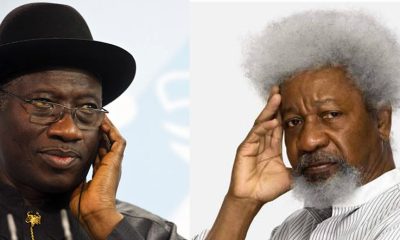
 metro2 days ago
metro2 days agoPresidency blasts Jonathan, Soyinka over comments on emergency rule in Rivers
-
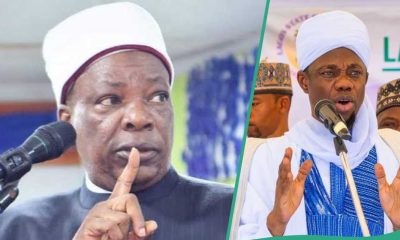
 metro14 hours ago
metro14 hours agoAttack on Mufty of Ilorin: Onikijipa Family Charges Stakeholders to Call Sheikh Habibullahi Al-Ilory to Order
-

 Health20 hours ago
Health20 hours agoNigerian doctor pioneers W’Africa first robotic prostate cancer surgery
-
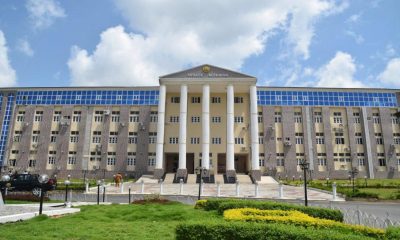
 metro2 days ago
metro2 days agoAdeleke University didn’t suspend Muslims for praying – MSSN
-
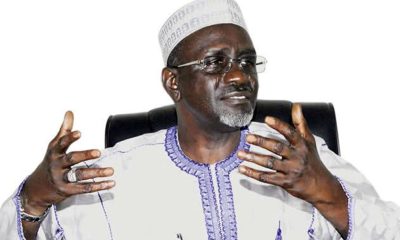
 Politics3 days ago
Politics3 days agoAtiku, Obi, El-Rufai’s coalition can’t unseat Tinubu – Shekarau
-

 metro3 days ago
metro3 days agoDisregard court order against Rivers Administrator, says Fubara’s aide



